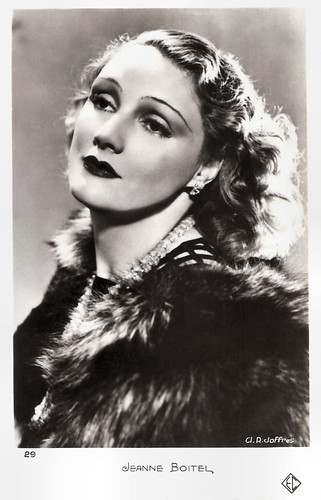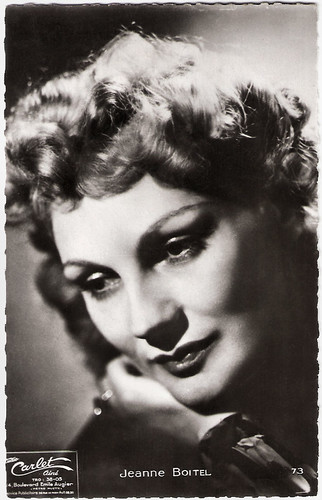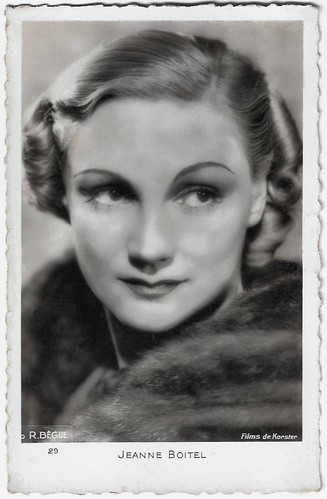
French postcard by Edition Chantal, no. 29. Photo: R. Joffres.

French postcard, no. 73. Photo: Carlet Ainé, Paris.
A refined grande dame
Jeanne Marie Andrée Boitel was born in Paris in 1904. Boitel had a passion for the theatre - she was on stage from the age of 19 - and studied at the Paris Conservatoire, graduating in 1924. After a fine start in her career as a stage actress, her beauty and singing talent were discovered by film directors.
She made her first film in Berlin, Le petit écart/The Small Gap (1932), co-directed by Henri Chomette, René Clair's older brother, and the German actor and filmmaker Reinhold Schünzel. Her partner was Pierre Richard-Willm, whom she reunited with in Un soir au front/One Evening at the Front (Alexandre Ryder, 1931) based on the play by Belgian playwright Henri Kistemaeckers. She played a young woman in Alsace, still annexed to the German Empire, who saves and loves a French officer but remains faithful to her German husband.
That same year, she starred opposite Victor Francen, the loyal servant of the Duke of Reichstadt, in L'aiglon/The Eagle (Victor Tourjansky, 1931) written by Edmond Rostand. She ended the year with boulevard comedies, including L'amoureuse aventure/Amorous Adventure (Wilhelm Thiele, 1931) starring Albert Préjean.
The year 1932 remained just as active with Chotard et Cie/Chotard and Company (Jean Renoir, 1934), in which Fernand Charpin prevents his daughter's marriage to a budding writer, and Trois pour cent/Three per cent (Jean Dréville, 1934), in which the parents of a poor young man prevent his marriage to a rich girl!
She reunited with Reinhold Schünzel in Berlin for Les dieux s'amusent/The Gods at Play (Reinhold Schünzel, Albert Valentin, 1934), a musical based on Greek mythology, in which Jeanne was a very pretty Alcmène, wife of Amphitryon, alias Henri Garat. She was also very convincing as Madame de Pompadour in Sacha Guitry's Remontons les Champs-Élysées/Let's Go Up the Champs-Élysées (1938). During the 1930s, she made around thirty films and worked with some of the biggest names in French cinema. Her natural distinction destined her - and confined her - to the role of a refined grande dame.

French postcard by A.N., Paris, no. 667. Photo: G.P.F.A.

German postcard for Das Programma von Heute by Ross Verlag.
Madame Maigret
After the Occupation, Jeanne Boitel refused to compromise with the Germans, who controlled all cinema from 1940 to 1944, and returned to her original passion for theatre while working for the Resistance.
Through her involvement in the Resistance, she met Jacques Jaujard, curator of the Louvre Museum. Under the code name of "Mozart", she was sent to him to inventory and discuss the fate of the works he had hidden. They fell in love and married after the war, following Jaujard's divorce. After the war, Jeanne Boitel became a Sociétaire of the Comédie-Française. She considered herself too old to resume her film career where she had left off. She remained at the Comédie Française from 1948 to 1973.
In 1954, she made a modest return to the cinema for Sacha Guitry. He had directed her in Remontons les Champs-Élysées before the war and had fond memories of her. He courted her and finally persuaded her to take the part of Madame de Sévigné in the film Si Versailles m'était conté/Royal Affairs in Versailles (Sacha Guitry, 1953), followed by roles as the Duchesse de Dino in Napoléon (Sacha Guitry, 1954) with Raymond Pellegrin in the title role, before playing Sarah Bernhardt in Si Paris m'était conté/If Paris Were Told to Us (Sacha Guitry, 1955).
Her last screen appearance was as Madame Maigret in Maigret Tend un piège/Maigret Lays a Trap (Jean Delannoy, 1957), alongside Jean Gabin as George Simenon's famous police detective. This role brought her lasting fame, as for a long time she was the only Madame Maigret in cinema.
After one last small role in the television series Le neveu d'Amérique (1973), she retired from acting at the age of 70. Her courage during the Resistance earned her the Croix de Guerre, the Rosette de la Résistance and the Légion d'Honneur. Jeanne Boitel passed away in 1987 in her hometown Paris at the age of 83. She had a son with Jacques Jaujard, François-Xavier Jaujard (1946-1996), a translator and publisher.

French postcard by CE - Cinémagazine Selection, Paris, no. 2040. Photo: Les Films Paramount.

French postcard, no. 29. Photo: R. Bègue / Films de Koster. Jeanne Boitel in Ceux de demain/Those of tomorrow (Adelqui Migliar, George Pallu, 1938).
Sources: Caroline Hanotte (CinéArtistes - French), Wikipedia (French and English) and IMDb.
No comments:
Post a Comment